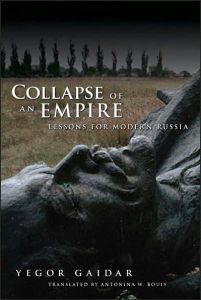Join getAbstract to access the summary!

Join getAbstract to access the summary!
Yegor Gaidar
Collapse of an Empire
Lessons for Modern Russia
Brookings Institution Press, 2007
What's inside?
An analysis of the Soviet Union’s collapse, by one of the great Russian reformers.
Recommendation
This remarkably accessible, lucid survey of recent Russian history is a must-read for anyone interested in global affairs. Yegor Gaidar, an acting prime minister under Boris Yeltsin, provides a concise yet comprehensive summary of the course of empires during the 20th century, and draws some pointed lessons. His goal is to counter nostalgia for the glory days of the Soviet Union. getAbstract admires how effectively he executes his objective, with a step-by-step recapitulation of the economic blunders that led inevitably to the Soviet Union’s dissolution. However, he also shows why those who expected democracy to grow must face the fact that it is on the retreat – and he leaves no doubt about Russia’s dangerous crossroads.
Summary
About the Author
Yegor Gaidar, Boris Yeltsin’s acting prime minister in 1992, was the architect of “shock therapy” reforms during Russia’s transition to capitalism in the 1990s. He is director of the Institute for the Economy in Transition, a Moscow-based research organization.


















Comment on this summary